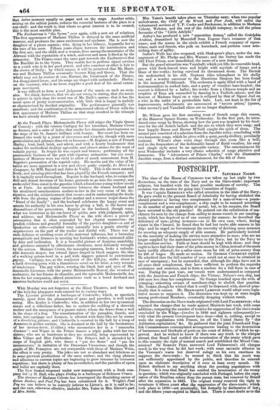At the French Plays, Mademoiselle Plessy still reigns the Virgin
Queen of Comedy; with the veteran Cartigny for her intendant, Madame Croset as duenna, and a suite of ladies that render her dramatic drawingrooms on the stage of the St. James's brilliant with beauty. Her court has been en- livened this week by a jester of cleverness and vivacity, though with more gesticulation and grimace than wit or humour—M. Reg,nier, a sort of French Harley; loud, hard, brisk, and adroit, and with a hearty bonhommie that makes his methodical drollery agreeable, and almost atones for the want of volatile gayety. In Scaiin he was expert and brazen; performing all the pantomimic business of the part with vigorous animation: but our recol- lections of Monrose were too vivid to allow of much amusement from M. Regnier's personation of the roguish valet. His merits and the value of his talent are more apparent in a new and clever petite comedy, Le Atari a la Campagne, by MM. Bayard and Jules de Vailly. This is the most natural, lively, and amusing piece that has been played by the French company; and it is capitally acted throughout. Regnier is the husband, who, to escape the dull and dismal decorum of his home, pretends to go into the country, and seeks relief from ennui in the gayeties which a handsome young widow revels in at Paris. An accidental rencontre between the truant husband and his straitlaced sanctimonious mother-in-law in the very scene of his dis- sipation, and the eclaircissement that ensues, end in emancipating the docile wife from the gloomy regime of her mother and a morose major-domo the "friend of the family" ' • and the husband celebrates the happy event and asserts his authority in his own house by giving a ball, to the horror and discomfiture of his persecutors. Regnier as the husband, though some- what too boisterous in his oat-burst of spirits, acts with judgment, spirit, and address; and Mademoiselle Plessy as the wife shows a power of personation that is often concealed by her elegant mannerism: the prudish coldness and graceful formality of the passive daughter—a sort of Quakerism on stilts—subsided very naturally into a gentle alacrity of acquiescence on the part of the tender and dutiful wife. There was no rude defiance or exulting scorn of the maternal influence, but a becoming promptitude and firmness in meeting her husband's wishes, animated alike by duty and inclination. It is a beautiful picture of feminine amiability and goodness actuated by affectionate obedience, most delicately wrought by the actress. Madame Croset, the managing mamma, looks a redoubt- able domestic despot: her rotund figure draped in black suggests the idea of a walking poison-bowl in a pall with daggers pointed to exterminate gayety. Cartigny, too, as the coadjutor of this kill-joy, stalks about in a lurid dressing-gown with a thunderous scowl on his brow, a very tornado of intolerance. The gay widow, wearing the black hair and eyes of Ma- demoiselle Lievenne, with the pretty Mademoiselle Bowel, the sweetest of soubrettes, for her femme de chambre, and the agreeable Mademoiselle An- drea for her companion, offered attractions such as a bored husband and amorous bachelors could not resist.


























 Previous page
Previous page